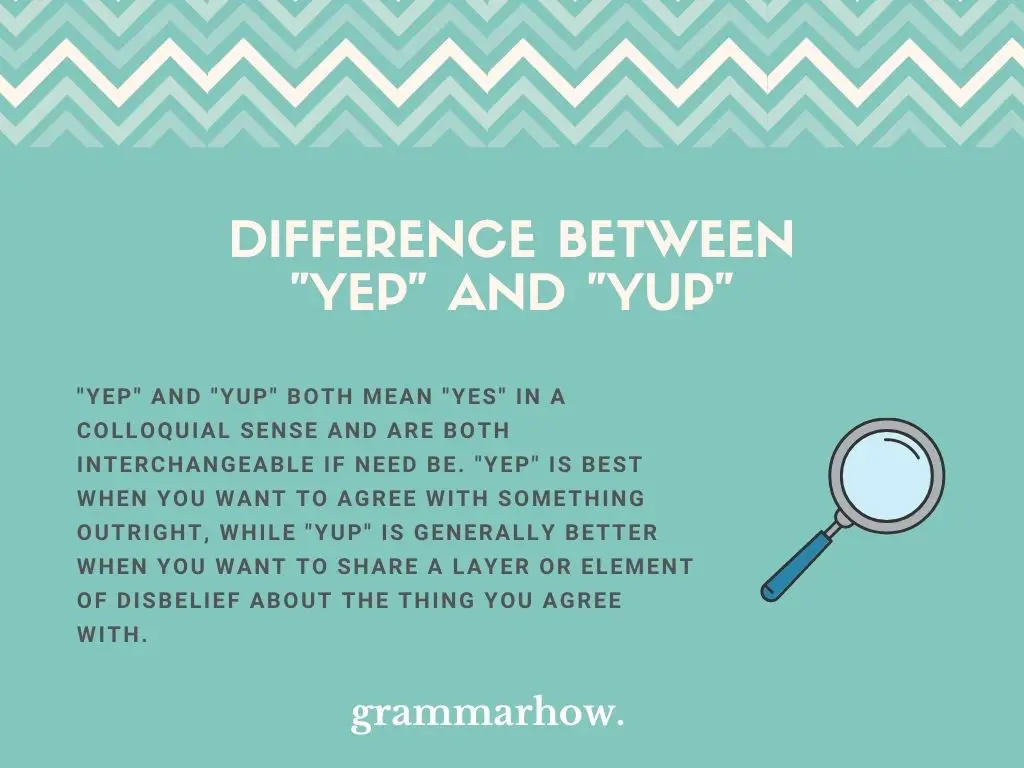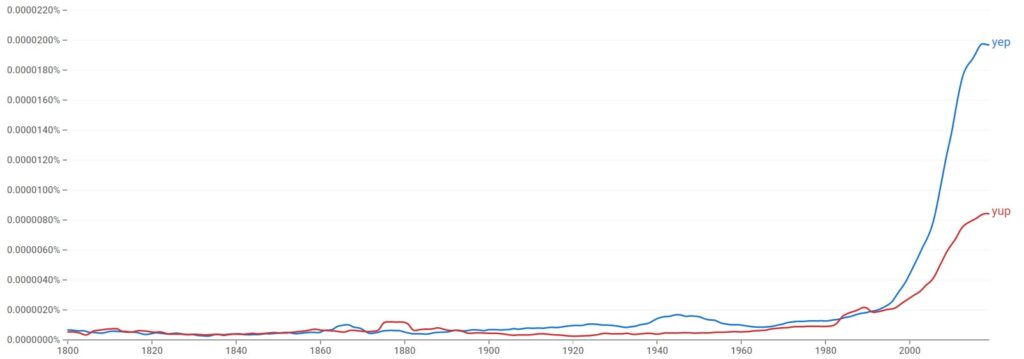“Yep” and “yup” are common colloquial words to agree with somebody. However, do they come with the same meaning, or are there slight differences we need to know about? This article will look into the answer to that question.
What Is The Difference Between “Yep” And “Yup”?
“Yep” and “yup” both mean “yes” in a colloquial sense and are both interchangeable if need be. “Yep” is best when you want to agree with something outright, while “yup” is generally better when you want to share a layer or element of disbelief about the thing you agree with.

“Yup” is almost sarcastic in tone, and you can usually tell that when someone says it to you.
“Yep” is the more agreeable of the two, and it’s the informal replacement for the more widely used “yes”, which you’d find in both formal and informal settings.
Does “Yep” And “Yup” Mean “Yes”?
“Yep” and “yup” both mean “yes.” Some native speakers use them interchangeably based on the person they speak to. For friends and family, you might be more inclined to use “yep” or “yup,” while for more formal matters, “yes” might be your best choice.
Each word works to affirm or confirm something, mostly in the form of a question. We can see that in the following ways:
- Would you like to go out with me?
- Yep
- Would you like to dance with me?
- Yup
- Would you like to have fun with me?
- Yes
All three phrases confirm or accept an offer somehow, and they are interchangeable for this reason.
Is “Yep” Or “Yup” Used The Most?
Now let’s see how “yep” and “yup” are used in common English. It might help you to learn which of the two is more popular. That way, you can focus your learning on the one that native speakers seem to use more.
According to Google Ngram Viewer, “yep” is the most popular choice and the variation we use more often. “Yup” does get used, but it’s not nearly as popular.

We don’t use “yup” quite as much due to the spelling difference. “Yep” is much closer to “yes” in spelling, which helps us to explain what we mean when we use it since the two spellings are almost identical.
While “yup” is still a commonly used and well-known word, the spelling difference might be a little too confusing for some. It’s especially confusing for learners who aren’t aware of the more conversational tone we can use in place of “yes.”
Examples Of How To Use “Yep” In A Sentence
Some examples will go a long way to helping you understand when “yep” is used.
- Would you like some ice cream tonight?
- Yep!
- Did you hear about the good news?
- Yep! I did.
- Wait, this car is $34,000?
- Yep, I’m afraid so!
- Have you been to the upper city lately?
- Yep, and I had a great time.
- Are we going to make it in time?
- Yep! Just don’t panic!
“Yep” works just like “yes,” and we can use it to answer a wide range of questions that require a “yes” or “no” answer.
Examples Of How To Use “Yup” In A Sentence
“Yup” is a little more specific in meaning. We can use it interchangeably with “yep,” but if we really want to show the difference, you’ll notice the tone from these examples.
- You’re telling me that you didn’t get any of your homework done?
- Yup. Now I don’t know what to tell the teacher.
- This car costs $50,000?!
- Yup. I can’t believe it myself.
- Have you done it all already?
- Yup. It was really easy.
- Have you visited your mother recently?
- Yup. Stop pestering me about it.
- Will you come to the wedding when it happens?
- Yup. I kind of have to.
“Yup” is more sarcastic. We use it when we want to share our disbelief, which is best when we can’t believe the answer ourselves or when it should be obvious what our answer is going to be.
Is It Rude To Say “Yup” And “Yep”?
There is always a difficulty in knowing what’s polite, rude, and simply informal or formal. “Yup” and “yep” fall into this category.
“Yup” and “yep” are not rude in informal situations. You can use them to agree with something and show that you’ve confirmed your response. However, formally, they are rude, as they show an element of laziness that you wouldn’t otherwise receive with “yes.”
“Yup” and “yep” are best left away from the workplace (or any professional situation).
You won’t be impressing anybody of any importance if you decide that you want to use either of them, and you should instead stick to “yes” to avoid any uncomfortable situations.
Is “Yup” And “Yep” Actual Words?
In the past, “yup” and “yep” were not actual words. For a word to be true, it needs to be officially recognized by dictionaries published in English. As time goes on and words become more popular, there’s always a chance that they could become official words.
“Yup” and “yep” are actual words, and dictionaries formally recognize both in English. We can use them to mean “yes,” and dictionaries decide to include their meanings because of how common they were in the past.
To prove this, we can refer to The Cambridge Dictionary for both words:
The definition of “yup,” according to The Cambridge Dictionary, is “(spelt the way it is spoken) yes.”
The definition of “yep,” according to The Cambridge Dictionary, is “yes.”
The meanings are identical (though “yup” sways more toward the spoken aspect of the word), but the dictionaries recognize them as “yes” variants all the same.
Yep And Yup – Synonyms
Finally, if you’re not too happy with “yep” and “yup,” or you’d rather just have some other options at the ready, these synonyms will be the choice for you.
- Yes
- Okay
- Alright
- Of course
- Indeed
- By all means
- Sure
- Certainly
- Roger
- Aye
- Okie dokie
These synonyms all vary in how they say “yes,” but they all work in their provided contexts.

Martin holds a Master’s degree in Finance and International Business. He has six years of experience in professional communication with clients, executives, and colleagues. Furthermore, he has teaching experience from Aarhus University. Martin has been featured as an expert in communication and teaching on Forbes and Shopify. Read more about Martin here.
